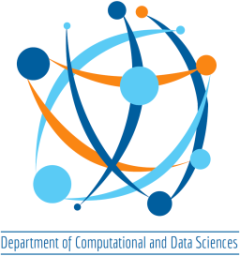Department of Computational and Data Sciences
Introduction to Scalable Systems
- Instructor: Sathish Vadhiyar (www | email) and Chirag Jain (www | email)
- Teaching Assistant: Parvesh Barak
- Course number: DS221
- Credits: 3:1
- Semester: Aug, 2025
- Lecture: Tue/Thu 11:30 AM-1 PM, in-person CDS 202 (First class on Aug 5, 2025)
- Lab: As announced
- Microsoft Teams Link: Link (Use IISc Office 365 account to login)
- Survey form for Students (Please fill this after the first class, by Aug 8, 2025)
- Attendance Sheet
[DS221 2024 Website] [DS221 2023 Website] [DS221 2022 Website] [DS221 2020 Website] [DS221 2019 Website] [DS221 2018 Website][DS221 2017 Website]
Overview
This course covers computer systems topics that are essential for students engaging in computational and data sciences. It introduces topics on architecture, OS and data structures that may be new to students without a degree in Computer Science. Then it moves to more advanced topics on tree/graph data structures, HPC/GPGPU programming and Big Data platforms.
Some of the topics covered are:
- Architecture: computer organization, single-core optimizations including exploiting cache hierarchy and vectorization, parallel architectures including multi-core, shared memory, distributed memory and GPU architectures;
- Algorithms and Data Structures: Overview of matrices, trees, queues, graphs, concurrent data structures; Using GitHub Copilot/Prompt Engineering; Performance and scalability analysis; Algorithmic complexity analysis and algorithmic strategies;
- Parallelization Principles: motivation, challenges, metrics, parallelization steps, data distribution, PRAM model;
- Parallel Programming Models and Languages: OpenMP, MPI, CUDA;
- Distributed Computing: Commodity cluster and cloud computing; Distributed Programming: Apache Spark programming model for Big Data processing.
This course is a precursor to more advanced courses like DS 295: Parallel Programming, DS 256: Scalable Systems for Data Science, and DS202: Algorithmic Foundations of Big Data Biology offered in the January term.
Pre-requisites
This is an introductory crash-course on computer systems, algorithms, HPC and Big Data platforms. So the pre-requisites are minimal: Basic knowledge of computer systems, data structures and programming, and algorithms. However, the course will have a rapid pace and students are expected to pick up the skills rapidly through self-learning.
Grading Scheme
- Architecture
- 1 Quiz – 10 points
- Algorithms and Data Structures
- 1 Programming Assignment- 20 points
- 1 Quiz – 10 points
- Parallel Programming
- 1 Written Assignment – 10 points
- 1 Programming Assignment – 10 points
- Final Exam (40 points)
- 20 (Algos, Data Structures and Big Data) + 20 (Parallel Programming)
Resources
- Data Structures, Algorithms, and Applications in C++, 2nd Edition, Sartaj Sahni
- Parallel Computing Architecture. A Hardware/Software Approach. David Culler, Jaswant Singh. Publisher: Morgan Kauffman. ISBN: 981-4033-103. 1999.
- Parallel Computing. Theory and Practice. Michael J. Quinn. Publisher: Tata: McGraw-Hill. ISBN: 0-07-049546-7. 2002.
- Computer Systems – A Programmer’s Perspective. Bryant and O’Hallaron. Publisher: Pearson Education. ISBN: 81-297-0026-3. 2003.
- Introduction to Parallel Computing. Ananth Grama, Anshul Gupta, George Karypis, Vipin Kumar. Publisher: Addison Wesley. ISBN: 0-201-64865-2. 2003.
- An Introduction to Parallel Programming. Peter S Pacheco. Publisher: Morgan Kauffman. ISBN: 978-93-80931-75-3. 2011.
- Online references for OpenMP, MPI, CUDA
- Lecture slides
Tentative Schedule
- Architecture, VSS (5 lectures, Aug 5-19) pdf
- Computer organization including cache hierarchy, locality
- Prof. Rajaraman’s document on floating point representation pdf
- Quiz (10 points)
- Algorithms and Data Structures, CJ (13 lectures, Aug 21- Oct 7)
- Lists and matrices pdf
- Algorithmic analysis and complexity pdf
- Data Structures (Part 1): Arrays, Stacks, Queues, Trees pdf
- Prompt Engineering using Copilot to design code
- Data Structures (Part 2): Search trees, Hash tables pdf
- Performance Analysis of hash tables pdf
- Data Structures (Part 3): Graphs pdf
- Graph algorithms: Single-source shortest path pdf
- Algorithmic Strategies pdf
- Assignment and Continuous Assessments (30 points)
- Big Data programming models: Apache Spark
- Parallel Computing, VSS (11 lectures, Oct 9 – Nov 13)
- Parallel architectures pdf
- Shared and Distributed memory architectures
- Many-core architectures pdf
- Parallelization Principles pdf
- Parallel Programming Models and Languages
- Shared memory: OpenMP pdf
- Distributed Memory: MPI – pt2pt, collectives pdf
- GPUs: CUDA pdf
- Sample Parallel Algorithms
- Sorting, Searching pdf
- Final Exam (40 points) on Friday, November 28, 9 am – noon
NOTE: Besides these lectures, there will be several tutorials as well. The schedule for these will be announced in class.
Reading
- Parallel architecture – Grama et al. – 2.4, Many-core – Google for NVIDIA A100 white paper
- Parallelization principles – Grama et al. – 3.1, 3.5, 5.1-5.6; Culler and Singh – 2.2, 2.3
- OpenMP tutorial: http://www.llnl.gov/computing/tutorials/openMP
- MPI online tutorial: “MPI complete reference”. Google for it.
- CUDA: Google for NVIDIA CUDA programming guide.
- PRAM: Reading: Book “Parallel Computing: Theory and Practice” by Michael J Quinn. Pages 25-32, 40-42, 256
- Parallel algorithms
- Parallel Quick sort – the corresponding portion in the text book by Grama et al.
- BFS
- Paper: A Scalable Distributed Parallel Breadth-First Search Algorithm on BlueGene/L. Yoo et al. SC 2005. (Pages 1-7)
- Paper: Accelerating large graph algorithms on the GPU using CUDA. Harish and Narayanan. HiPC 2007. (Page 5-8)
- For the rest, read the lecture slides.
Assignments
Teaching cluster notes on OpenMP and MPI for the assignment
Academic integrity
Any assignment or exam you complete in this course is expected to be your own work. You should attempt homework questions and programming assignments on your own, but are allowed to verbally discuss concepts with your peers. However, the solutions must be written in your own words. Direct use of material, ideas, figures, code or data authored by someone else without appropriate acknowledgement is not allowed.
Please note that there will be no tolerance of academic dishonesty. If someone is academically dishonest in this course, they will receive a grade of F, and the misconduct will be brought to the notice of the department Chair. See https://www.iisc.ac.in/about/student-corner/academic-integrity/ for more details.



